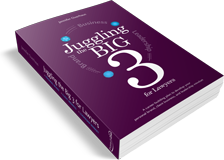Brand
Business
Leadership

“This book tells you all you need to know about how to get on.” The Times
“Relatively few books have been written with assistant solicitors in mind, about how to succeed at the business of being a lawyer… fewer still have devised a programme for so doing that runs alongside a book. This book does both.”Law Society (The Law Management Section)
5 star rating HR Magazine
As lawyers we know that things tend to happen at breakneck pace, leading to occasional feelings of being under constant pressure. At these times it’s important that you take care of yourself so you can remain (relatively!) calm and in control. Most lawyers aren’t hugely familiar with tools like meditation, but the truth is, just as your body needs regular exercise to remain fit and healthy, so does your mind. If you already meditate, you’ll know exactly what I’m talking about. But if you, like me, find it hard to relax, sit still, or even temporarily shut your brain down, then you’re probably already protesting, “I don’t feel comfortable with that New Age stuff. Besides, it’s the fact that my brain’s always rushing around that gives me an edge!” Believe me, I know that feeling. But, like me, you also might just be wrong!
Consider the “fight-or-flight” response, as originally discovered by Harvard physiologist Walter Cannon. This is our body’s innate emergency reaction to danger, physically preparing us, like all animals, to react fast when threatened. It is triggered by the brain’s hypothalamus, which releases a surge of adrenalin and related hormones, which in turn increase heart rate, respiratory rate, and blood pressure.
While most of us no longer require the fight-or-flight response for its original purpose sabertooth tigers not being too much of a threat these days, even in our profession!), we actually activate it more than ever—through stress. Most lawyers get tense on a daily basis: sitting in rush-hour traffic, fretting about missing a deadline, rehashing what was said in an argument . . . And each one of these moments—not exactly useful—can trigger the fight-or-flight response. Over time, frequent activation builds up stress hormones, which can result in health disorders.
Renowned Harvard cardiologist Herbert Benson, M.D., believes that the more frequently one activates the fight-or-flight response the more likely one is to develop high blood pressure. To counteract this, Dr. Benson has introduced the “relaxation response.” As the name implies, this is a state of relaxation in which the practitioner quiets the mind, causing a different part of the hypothalamus to release neutralizing chemicals. These chemicals trigger a decrease in heart rate, respiratory rate, and blood pressure, while boosting beneficial “Alpha” brain waves.
In his book The Relaxation Response, Dr. Benson acknowledges many techniques for its initiation (including meditation and yoga), suggesting that, whatever method we choose, we practice it for at least ten or fifteen minutes, once or twice a day. Although he refrains from prioritizing any single method, he does recommend two essential steps: repeating a word, sound, phrase, or muscle activity—such as deep breathing—and disregarding everyday thoughts as they come to mind.
Initiating the relaxation response doesn’t have to be complicated: just taking a walk or lying in a warm bath can work. Meditating can even be done in the midst of commotion—for example, on the underground while traveling to work—though this takes more practice.
I urge you: at least give it a try!
Posted on 15/08/2010